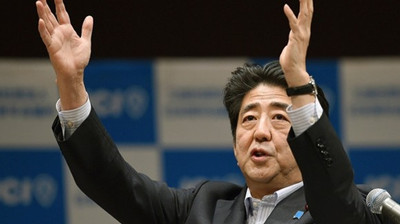Japan and Abenomics

Yet the BoJ's move strengthens another consensus among Japan's policymakers, which is that Mr Abe will soon be obliged to press ahead with a second rise in the consumption tax, next October, from 8% to 10%. Mr Abe has to decide by the end of this year if he is not going to, in order to introduce legislation to stop the hike. After a dreadful second quarter, when GDP shrank by an annualised 7.1%, many of Mr Abe's economic advisers are convinced that the initial rise was a mistake. A battle is on between the finance ministry, which is pushing for the increase to deal with Japan's ballooning public debt, and the prime minister's office, which leans towards altering the timetable. Akira Amari, the key minister for economic reforms, seems to favour sticking to the timetable.
譯文屬譯生譯世











